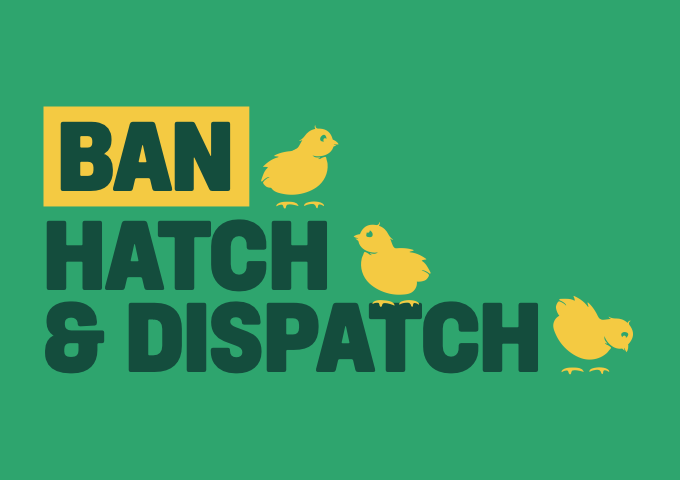Ban Hatch & Dispatch on BBC Radio 5

Brits want end to 45 million male chick deaths as new campaign urges Ministers to ‘Ban Hatch & Dispatch’
40-45 million male baby chicks are killed each year in the UK by inhumane means because they are not suitable for meat production
New campaign, Ban Hatch & Dispatch, calls on the UK Government to ban male chick culling to keep up with European neighbours.
New data released today finds most Brits would support new legislation to stop the unnecessary and inhumane killing of male chicks.
Every year in the UK, 40-45 million day-old male chicks are killed in the egg industry – usually by gassing – simply because they cannot lay eggs and are not suitable for meat production1.
Public polling reveals that 72% of UK consumers are concerned about male chick culling, with 74% in favour of stopping this practice by mandating the use of existing technology to determine the sex of chicks before they are born.
A new national campaign, Ban Hatch & Dispatch, launches today, urging the UK Government to ban male chick culling and follow other European countries who have introduced legislation to end the practice.
The campaign website includes an animated short film narrated by Stephen Fry, and an e-petition for the public to sign calling on the UK Government to act.
Ban Hatch & Dispatch calls for legislation that would make “in-ovo” sexing technology mandatory in the UK, paving the way for a more ethical and humane approach to egg production.
In-ovo sexing technology allows producers to determine the sex of a chick as early as day nine of incubation, enabling hatcheries to hatch only female chicks, and therefore eliminate the need to cull male chicks shortly after they are born. This technology, which is already mandatory in France and Germany, has been successfully used to eliminate the practice of male chick culling since the late 2010s.
To bring about this change in the UK, the Government would simply have to amend the Welfare of Animals at the Time of Killing (England) Regulations 2015. The campaign is calling for this to happen as soon as possible, so that the egg industry has time to transition throughout the rest of this Parliament.
Currently, “cull-free” eggs are not available in the UK. However, the same polling finds that consumers would be very happy to pay more for eggs that are cull-free, with the Government’s Animal Welfare Committee analysis estimating this would equate to just 1p per egg (i.e., 6p for a carton of six).
Ban Hatch & Dispatch is being led by The Vegetarian Society, the UK’s leading voice for the vegetarian and vegan movement. The petition calling on the UK Government to Ban Hatch & Dispatch can be signed at https://hatchanddispatch.vegsoc.org/
Richard McIIwain, CEO of The Vegetarian Society:
“For far too long, male chick culling has been an unavoidable and deeply concerning issue in the British food industry. The UK has always prided itself on leading the way in ethical food production and maintaining high animal welfare standards. Today, we have the technology to ensure this becomes the case in the egg production industry.
“Ending the outdated and unnecessary practice of male chick culling is the next natural step, aligning with the values of the British agriculture industry and the public, and our European counterparts. With innovation at our fingertips, we have a real opportunity to make a lasting change for the better.
“We urge consumers who support the campaign to sign the petition calling on the UK Government to Ban Hatch & Dispatch.”
Stephen Fry is not a spokesperson for the campaign and is not available for interviews or further commentary.
ENDS
Notes to editors
Notes to Editors
1https://assets.publishing.service.gov.uk/media/65eae6e062ff48ff7487b270/AWC_Opinion_on_chick_culling_alternatives.pdf
Richard McIlwain, CEO of The Vegetarian Society, is available for interview on request. Stephen Fry is not a spokesperson for the campaign and is not available for interviews or further commentary.
For all media enquiries, please contact vegsoc@pagefield.co.uk
Further information on the campaign can be found here, including the e-petition.
For more information on this story please contact press@vegsoc.org call 07973 108165.
The Vegetarian Society is a charity formed in 1847. Together we are working towards a better life for all. A better life for animals, for people and for the planet. We know small changes by many can make a huge difference. We work with communities, businesses and policy-makers to drive real change. From recipes and cookery classes to political campaigning, we produce good food to fuel the good fight. Find out more at www.vegsoc.org
